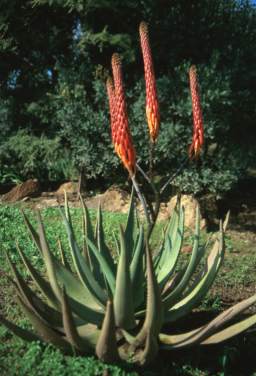Aloe reitzii var. reitzii
Aloe reitzii Reynolds var. reitzii
Family: Asphodelaceae
Common names: Reitz' aloe
Introduction
Although it is a rather rare species of aloe, it is easily distinguished by the handsome erect red flower spikes that are produced in summer (unlike most aloes that produce their flowers in winter.)

Description
Description
Aloe reitzii var. reitzii is a robust and spectacular aloe species which comes from the grassland areas of Mpumalanga.
This summer flowering habit makes it a useful subject for cold gardens where the flowers of other aloes often get frosted off in the cold winter months.
Distribution and habitat
Distribution description
This aloe species which comes from the grassland areas of Mpumalanga, but is restricted to a very small area in the vicinity of Belfast. This aloe is endemic to this area and occurs nowhere else in the world.
Ecology
Ecology
The added advantage of growing aloes in the garden is the attraction of sunbirds to the flowers for nectar. These colourful little birds are a joy to watch as they flit from flower to flower collecting the nectar and pollinating the flowers.
Growing Aloe reitzii var. reitzii
Grow
Reitz' aloe is not difficult to cultivate and makes a handsome addition to any garden. It tolerates both frost and fire in its natural habitat, and is easily propagated from seed although the seed is often in short supply. Fresh seed should be sown in spring on a well-drained seedling medium, lightly covered and treated with a fungicide. Seedlings will emerge after two to four weeks and can be transplanted at the age of six months into individual containers ensuring good drainage and full sun conditions. Seed grown plants may take five to seven years from sowing to flower.
Credits
Andrew Hankey
Walter Sisulu National Botanical Garden
March 2001
Plant Attributes:
Plant Type: Succulent
SA Distribution: Limpopo, Mpumalanga
Soil type: Sandy, Clay, Loam
Flowering season: Late Summer
PH: Neutral
Flower colour: Red
Aspect: Full Sun
Gardening skill: Easy
Special Features:
Horticultural zones









Rate this article
Article well written and informative
Rate this plant
Is this an interesting plant?
Login to add your Comment
Back to topNot registered yet? Click here to register.